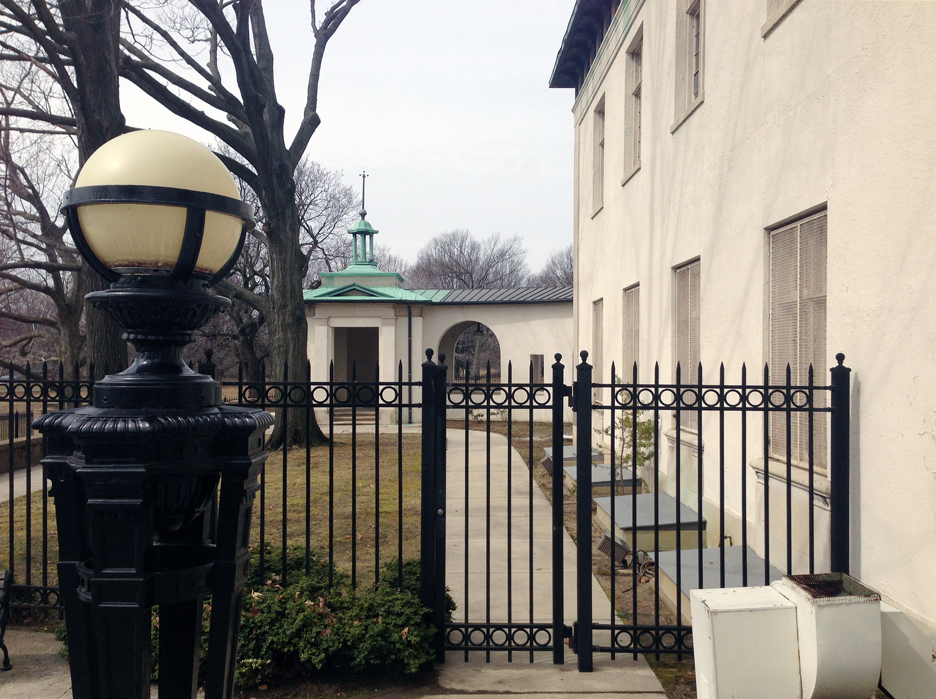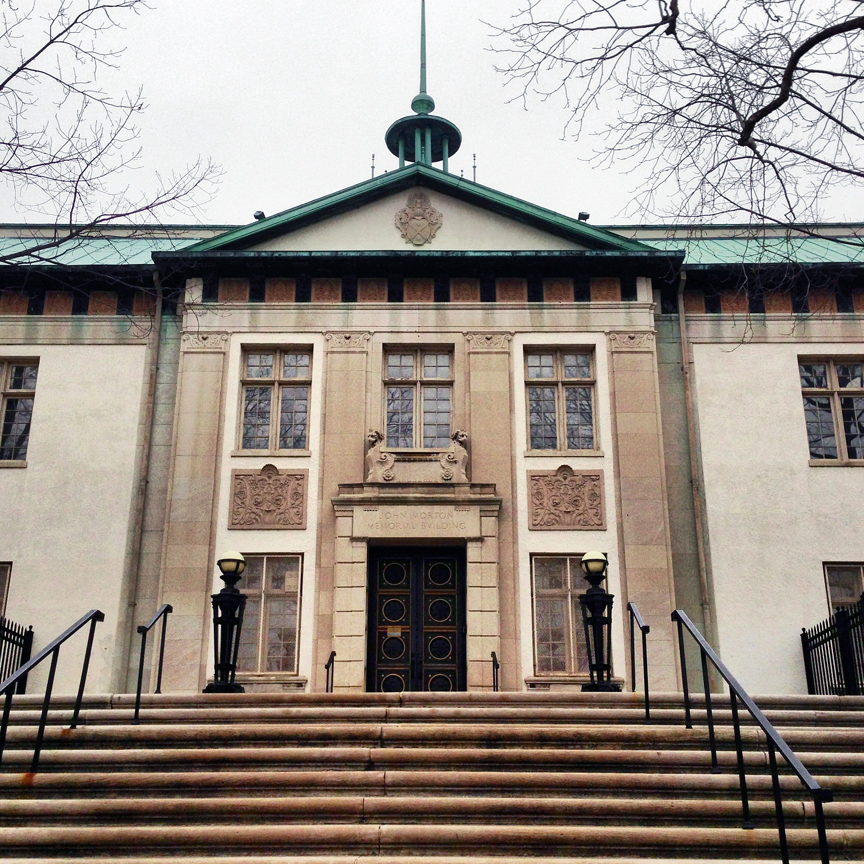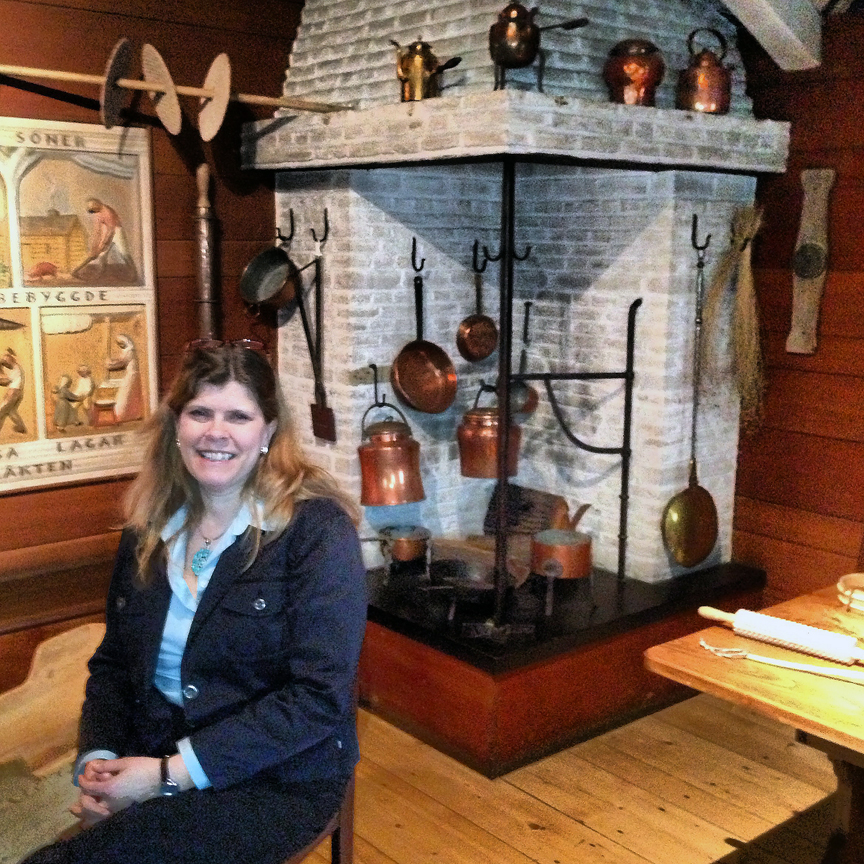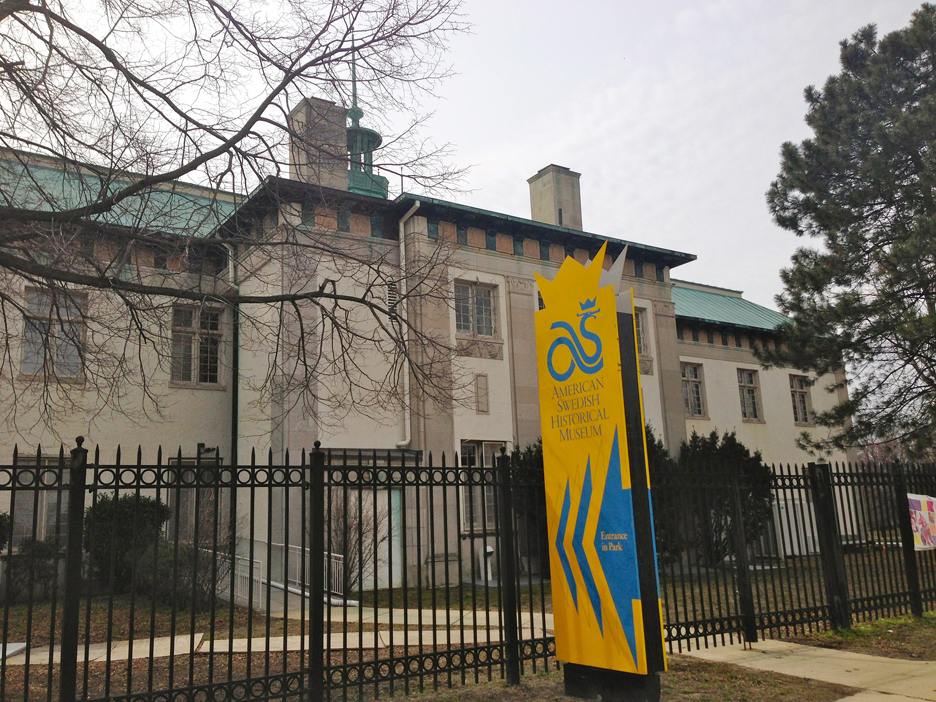A chapter from the novel, The Number 7
The main character finds and explores the American Swedish Historical Museum in Philadelphia, above.
-
 With ‘My Not-So-Swedish Family Christmas’ (Issue 20, 2014 )in mind we expected more of the same from Jessica Lidh’s book, The Number 7. This is not the case. The author instead took off exploring her Swedish roots locally, just after returning from studies in Sweden. Here is an excerpt from her book where the main character finds and explores the American Swedish Historical Museum in Philadelphia, above.
With ‘My Not-So-Swedish Family Christmas’ (Issue 20, 2014 )in mind we expected more of the same from Jessica Lidh’s book, The Number 7. This is not the case. The author instead took off exploring her Swedish roots locally, just after returning from studies in Sweden. Here is an excerpt from her book where the main character finds and explores the American Swedish Historical Museum in Philadelphia, above. -
-
Chapter XIV
-
 The imposing entrance to the American Swedish Museum, Philadelphia.
The imposing entrance to the American Swedish Museum, Philadelphia. -
-
“Good night?” I teased Dad at the Saturday morning breakfast table. Greta rolled her eyes at my badgering; unlike me, she seemed completely indifferent toward Dad’s new love life. He reached across the cream-colored vintage tablecloth I’d found in the attic and grabbed one of my cookies from their plate on the kitchen table. Tossing the small morsel into his mouth, he squinted, making a face.
“Gabe was cute!” Greta exclaimed through spoonfuls of cereal.
“Taller than I expected.”
“I like his eyes,” I added.
Greta agreed, lifting her eyebrows as she sipped her tea. “Absolutely!” she dabbed her mouth with a napkin. “Those lashes!”
“He was very nice,” Dad interrupted, an emblematic plea for us to tone down our girlish musings.
“Rosemary stayed late, Dad,” Greta stated matter-of-factly.
“She and I are going into the city today. We can give you girls a ride if you want to check it out. I know we haven’t sufficiently explored Philly yet. I’m sorry about that,” he said, reaching for another cookie.
“I’ve got plans,” Greta replied. Neither Dad nor I was surprised.
“I’d like to go, but I don’t want to cramp your style, Dad,” I harassed while smugly taking a bite of breakfast.
“I have no style, Louisa. The offer is on the table.” He spread his paper out on the table, smoothing its crease.
“Then I accept.”
Dad and Rosemary dropped me off at the Philadelphia Convention and Visitors Bureau while they headed off to Little Italy for lunch. I’d brought along my 35mm, hoping I would be inspired. It hung at my side as I stepped into the reception area of the visitors center. -
 ASHM Executive Director Tracey Beck in the Stuga room of the museum.
ASHM Executive Director Tracey Beck in the Stuga room of the museum. -
Colorful displays of brochures and business cards lined the walls. I leafed through the first display, waiting for something to catch my eye. As I began on the second shelf, my index finger landed on a blue-and-yellow brochure for the American Swedish Historical Museum. I slowly lifted the glossy pamphlet from the wood case.
“Excuse me?” I leaned over the Welcome Center desk toward the fragile-looking old lady who sat behind it. I held up the brochure for her to see and pointed, “What can you tell me about this museum?”
The woman’s skin hung loose around her cheeks and her pink lipstick looked like it had been applied by a raccoon. She lifted her eyeglasses from the gold chain that hung around her neck.
“The American Swedish Historical Museum,” she read aloud, and I wondered if she’d be any help to me at all. “Seems to me you’d want to go there if your family came from Sweden.” She really was something.
“A third of the Swedish population left during the immigration boom at the end of the nineteenth century, you know.”
Each word she said was delicate and spoken with determination.
Her voice was soft and high-pitched. “It’s open from noon to four today. But it’s a ways away, so you’d have to take a cab. It’s probably a $10 fare.”
“Thanks,” I nodded, satisfied.
“Good luck,” her voice wavered as I spun around, en route to find a cab.
The museum’s exterior was massive and loomed ominously at the bottom of a long, empty parking lot. An embossed sign, drilled into the mortar next to the door, advised me to ring a bell to be let in. A preoccupied middle-aged woman hurried me inside.
“Five dollars for student admission,” the woman said while shuffling through a stack of envelopes. Bills, to be sure. I handed her a ten and she gave me a look of disapproval like I was inconveniencing her.
“It’s a self-tour.” She handed me my change and a map of the museum.
“You start over there.” She pointed to the back of the lobby before scuttling away. -

-
I folded the map and put it in my back pocket, straining my neck to stare up at the lobby’s ceiling. Blue-and-gold painted squares framed a canvas of a newly discovered America: bare-chested natives meeting colonists in pewter helmets on a desolate sandy shore. English? Swedes? I didn’t know.
I crossed the empty lobby to an adjoining room where I read about Alfred Nobel and the Nobel Prize. I studied the wall of black and white photographs of Nobel Prize winners. All their expressions were somber, serious, and studious. This museum wasn’t anything like I thought it would be. Where was my grandfather in this lonely place? Where were the answers to my questions? Where was Gerhard? Trelleborg? Me? I trudged on. Maybe I’d made a mistake in coming. Maybe I wasn’t supposed to be here.
Once I was done exploring the main exhibits, I came to the final room of the museum—a simple library with thickly bound books with cracked spines, rows of VHS tapes, and a small selection of
DVDs. Across the library, a small, feeble man with white hair sat at a wooden table leafing through a photo album. On the bridge of his nose rested a pair of rimless square spectacles, and he eyed me suspiciously as he turned the page. He wrinkled his lips as he let out a long yawn. Waving it away, he covered his mouth and turned his attention back to the book in front of him. On the back of his chair hung an old herringbone jacket, and I noticed his shoes were untied and positioned next to his socked feet resting on the carpet below. Clearly, this man had settled in for the afternoon.
“Är du svensk?” The man grumbled halfheartedly. For a moment I wasn’t sure if he was addressing me or not.
“Swedish?” He inquired again sleepily; his voice seeped in a singsong accent. The library was warm, and even I found myself a little drowsy. I looked out the window; the clouds looked dark and heavy.
“No. Well, yes,” I answered unsure of the right answer. The man smiled, his eyes bright. -
“You look like my granddaughter. Come here, I want to show you something,” he reached over to pull a second chair closer. I draped my jacket across the back and took a seat next to his.
“That handsome young man—” he began, pointing to an old photo of men in old sports uniforms with their socks pulled up to their knees and their shorts shorter than modern fashion, “that man is me. I was seventeen.”
I leaned in closer to get a better look: some of the men were smiling, though most were not. But the boy the man pointed to was looking straight into the camera with a large grin.
“Soccer?”
“Handball,” the man replied. “Not very popular here in America.”
The man let out a deep sigh and turned another page.
“Me,” he pointed to another picture where the smiling boy could be seen again, still grinning. “We had just lost the match.”
“Then why are you smiling?”
“Because my girlfriend was taking the picture,” the old man winked at me and chuckled. He sat back in his chair and placed his palms on his chest, under his suspenders. “So, we seem to be the only ones here today. What’s your excuse?”
“Curiosity,” I said as rain began to sound against the window. Pit, pit, pit, pit.
“Aha . . . ” The man smiled running his hands up and down the elastic straps. His eyes were gray, kind, old. His skin was loose and blotchy: like droplets of brown watercolor had fallen from a suspended paintbrush above. His ears had tufts of white cotton sprouting from inside, and his eyebrows sat low and bushy.
“Can I help you?” He cocked his head to the side, with budding interest.
“I don’t know.” I bit my lip, uncertain how to proceed. “My grandfather came from Sweden. I need to know more about him.”
“Need to, huh? Solving some ancient family mystery?” He chuckled before scratching his nose and becoming serious. -
What an odd thing for him to guess, I thought, my mouth slightly ajar.
“Well I happen to be from Sweden, too,” he continued, “But first . . . ” The man looked down at a brass watch on his wrist. “It’s time for fika.”
“Fika?” I asked, unaware of its meaning.
“Coffee, dear,” the man pushed away from the table and I watched him stretch his arms out and flex his toes before placing his shoes back on his feet. “It’s a terrible thing, getting old.” He stood and I reached for our jackets, but he just waved me on. “Leave them, we’ll be back. And you can see,” he held out his arm and gestured around the room, “there’s no one to take them.”
I followed the old man whose name I did not know to an old elevator and stepped inside. He seemed friendly and harmless enough. I watched as he pushed the round “B” button. The light on the button was out, and I wondered how long it had been dark. We rode in silence down two floors to the basement.
We continued into a utility kitchen where the man reached into a cabinet and retrieved a can of coffee and a French press.
“The first thing you should know about us Swedes is that we take coffee breaks,” the man said.
“That explains a lot. My dad and I are addicted,” I grinned.
He took five heaping scoopfuls from the can and dumped them into the glass container. He walked gingerly to a large coffeemaker and pulled down on a red lever, releasing steaming water into the press. “There are three things you need for a successful fikapaus: good coffee, which we have here,” the man held up the French press and handed it to me, “don’t push it down just yet.” He walked farther into the kitchen to a stainless steel refrigerator and struggled to haul open its heavy door. “Cookies . . . or cake,” he pulled out a plate of delicacies: pink cookies, round cinnamon rolls, dark chocolate balls, and fat little tubes of something light green. “Come . . . ” He gestured for me to follow him into another room, flipped on a dim floor lamp, and slowly lowered himself into an oversized armchair. Next to the chair were a small stool and a table where he set the plate. The cinnamon rolls, dotted with large chunks of sugar, looked especially divine. I placed the coffee beside him.
“Ah, the cups,” he began to pull himself from the chair but I ran back to the kitchen where I searched four cabinets before finally finding a pair of chipped teacups.
“And the last thing?” I asked him, entering the room again.
“The last thing is a friend.” He smiled, pushing down the press and enveloping the whole room with the smell of bitter coffee. “So there,” he said, taking a cup from me, filling it with the dark brew, and returning it to my hands. I settled onto the stool next to him as thunder clapped from somewhere above.
“You would think I work here, but I don’t. I just give them money and they let me come here every week to peruse the library and drink their coffee,” the man chuckled and took his first sip. “I’ve donated half of the library, too. I used to think my children would want my old books, but . . . ” the man set his coffee down and shrugged his shoulders, “some people just don’t care about the past. Either that, or they’re afraid of what they’ll find when they look back.”
I nodded my head, immediately thinking of Dad. I sipped slowly, careful not to burn my tongue. I reached for the plate of sweets and began to nibble on one of the cinnamon rolls. It tasted as divine as it looked.
“So, flicka, let me help you solve your mystery. What part of Sweden was your grandfather from?”
“The south. Trelleborg.” I stared at the way the man’s hands shook. I tried to act nonchalant but I was studying him intently, secretly wishing it were my Grandpa in front of me. I had so many questions for him. So much left unanswered.
“Skåne,” the man nodded his head, “where the fields are painted yellow. I, too, am from a coastal town. Landskrona. Have you been there?” -
“No. Unfortunately my grandfather died before I knew him.”
“Skåne used to belong to the Danes, did you know that?”
“No.”
“In 1658, Sweden took it back. But to this very day, the people of Skåne still sound Danish. We speak deep in the backs of our throats,” he tilted his head back and tapped his Adam’s apple with his forefinger.
“Truthfully, I think we sound a bit like frogs.” The man laughed, a phlegmy cough that made him choke.
“You’re telling me my grandfather sounded like a frog?”
“He did, indeed,” the man smiled. “Is he your morfar eller din farfar? Your mother’s father, or your father’s father?”
“My dad’s dad. Gerhard Magnusson.”
“And your father? He hasn’t told you much about him?”
“It’s kind of a long story . . .” I shifted my weight on the stool.
“All the good ones are,” the old man winked. “How do you like the coffee?”
“It’s strong but good,” I said truthfully. “Especially on days like today.”
The man sat quietly for a couple moments, sipping his coffee and smiling.
“There are books upstairs that we could research,” he pointed to the ceiling. “Find out more about your Gerhard Magnusson.”
“I’d like that.”
“Why does it take people so long to want to discover more about where they come from? It took me sixty-eight years to begin to wonder. Maybe,” the man scratched his chin, “the closer we get to the end, the more interested we are in the beginning.”
I took another bite of my cinnamon roll, wishing I had a better idea what I was supposed to do with my discovery, my family secret. Was I supposed to tell Dad or not? When would I know the answer?
Or was I supposed to die with the secret like my grandparents did?
“But you,” he raised his cup to me, “why the curiosity? You’re what? Fifteen?”
“Sixteen.”
“My granddaughter’s fifteen and she hasn’t once asked me about Sweden. So I worry. All of this,” he raised a trembling index finger to his aged temple, “all of this will just disappear one day. Gone. Lost forever. And I wonder, are the memories—the stories of my life—worth anything to anyone other than me?”
“I have to believe so. After all, finding lost stories is what brought me here today, right?”
The man let out a short “Mmm,” but I didn’t know if he was agreeing.
“I’ve spent countless hours up there in that little room dwelling on the single irony that the legacy I leave will be the collections of other people’s stories in my donated books. Not one book is about me.”
“That’s sad,” I sighed. “What I wouldn’t give to find my grandfather’s story in a book somewhere.”
“Would you read it?” The man looked at me pleadingly, his eyes hopeful.
“It’s a funny thing, you know. I think I’m reading it now. Being here . . . discovering things about him, discovering things about myself,” I admitted. What was it about this old man that made me able to speak so openly, so honestly? Maybe it was because we seemed to be looking for the same thing—a bridge between our pasts and our futures. Or maybe it was because he was the only one I could talk to.
“This mystery, this journey, wouldn’t be possible if I knew where to find the answers. This wouldn’t be the same if I were just reading it in a book. There’s something better in having to look for it, to seek it out.”
“So should I leave my memories behind?”
“Of course you must! You must leave them behind! I mean, if that’s how you want to think about it,” I blushed. “But that’s the thing . . . your granddaughter? She’s not ready for them yet. When she’s ready, she’ll find them. As long as you leave them for her. You have to leave them for her, otherwise, you’re right. They’ll be lost.”
“Thank you,” the old man reached over and tenderly patted my hand. “More coffee?”
By the end of the afternoon, the old man and I had consumed an entire press of coffee and leafed through six of his large books filled with old newspaper clippings, photographs, and other descriptive historical texts. He’d shown me a Swedish book with gold lettering and a cracked spine, and opened it to a map of Scandinavia during World War II.
“You see these countries in blue?” He put his thumb on Denmark and then on Norway. “And this one in red?” He crossed over Sweden into Finland. “They were all invaded. Finland by Russia, Norway and Denmark by the Germans.”
“Why doesn’t Sweden have a color?” I asked with interest, looking over the map. I’d never seen one like it before. -
The old man closed the book and took out a cloth handkerchief.
He dabbed his nose and sighed heavily. I couldn’t tell if the pause was intentional.
“We don’t . . . we don’t like to talk about that,” he folded the cloth and tucked it back into his pocket. “Maybe another time . . . ”
I didn’t press the issue though I was dying to know more. The old man was visibly uncomfortable, but it seemed unfair of me to ask him to continue. He’d been so helpful already, and stories had to be told at their own pace. I was learning that all too well.
He pulled out another text and his mood seemed to change. He smiled warmly, seemingly amused with himself. With a botanist’s guide in one hand and an old map in the other, the old man taught me Sweden’s different provinces and their corresponding flowers. He pointed out the city where he grew up and dragged my finger east across the Baltic Sea to the Swedish island Öland.
“Where you can eat the best potato dumplings,” the man licked his lips longingly. “My grandmother made the best potato dumplings with salted pork in the middle. I can still taste them, just the way she made them.”
At four o’clock I reluctantly gathered my things together and asked the woman at the front desk to call me a cab.
“Thanks for entertaining an old man on a rainy afternoon.” He took off his glasses and held out his hand to me. “If you ever need anything, or you desire another fika, you know where to find me. I hope you solve your mystery.”
“There is one thing,” I suddenly remembered the postcard in the attic and scrolled through the pictures on my phone to find the snapshot. I held up the screen for the old man to see. “Can you tell me what it says?”
The old man squinted and held his glasses up to his nose. He read the message aloud and it felt good to finally hear the language as it was written. It’s not like I knew how to pronounce the foreign words.
And when I’d shown the photo to Dad, he’d only shrugged.
“It says, ‘I’m thinking of you always. Can you forgive me? You must forget me.’” The old man looked at me quizzically. “What does it mean?”
“I don’t know,” I sighed, clearing the screen and pocketing my phone. “Thank you for today. And I hope you do leave those memories for your granddaughter. I’m beginning to realize that’s exactly what my grandfather did for me in his own way,” I shook his pale hand and thanked him again before turning to go.
“Hej då, flicka.”
“Goodbye.”
In the cab back to the visitors center, I realized how happy I was to have spent the entire day in the Swedish museum. It didn’t matter that my camera had stayed in its case. I was meant to spend the afternoon with that old man. He’d taught me more about Sweden than anyone so far. More than even Grandma.
Dad and Rosemary were waiting for me when I returned to the visitors center. They were sitting on the steps, holding hands, excitedly bragging about their day. It involved window-shopping at Rittenhouse Row before discovering what they deemed their “favorite sight of the day”: The Dream Garden, a 100,000-piece glass mosaic by Maxfield Parrish and Louis Comfort Tiffany.
As we climbed into the car to head back to October Hill Road, Dad and Rosemary presented me with a cannoli packed with sweet ricotta cheese. I didn’t have the heart to tell them it wasn’t half as good as the Swedish cinnamon roll I’d eaten during my first fikapaus.
I ate the pastry quietly in the backseat, thinking about how strange it was that both Dad and I had spent the afternoon looking at intricate pieces of two very different mosaics. Would he be as interested in mine as I was? Would he want to know how he might be, in fact, the center of it all? -
Published by special permission from the author Jessica Lidh (http://www.jessicalidh.com) and the publisher, Merit Press (http://www.adamsmedia.com/merit-press-books).
-
-
-
